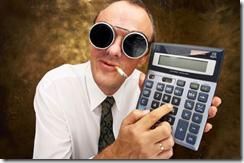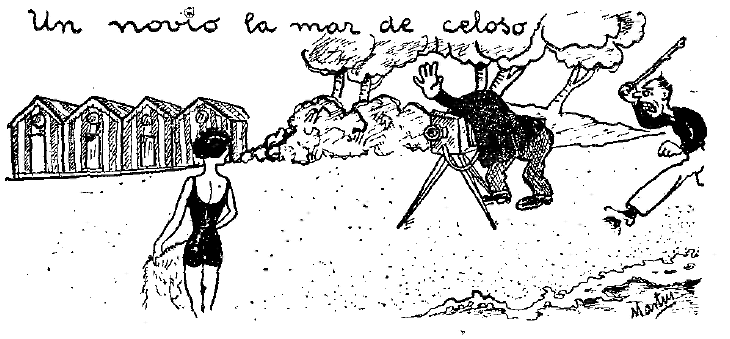
| Языки :: Испанский |
| Аудио |
 |
|
|
340 |
Español |
Spanish |
|
Lección Ciento nueve (109) |
||
| Un buen contable (continuación) | A good accountant (continued). | |
| 1 |
Regresé al cabo de una hora. — Confieso que estaba equivocado (1), dije; ahora veo que el total es de 20 pesetas. |
I came back at the end of an hour. — I confess that I was mistaken, I said; I see now that the total was 20 pesetas. |
| 2 |
El jefe me miró severamente : — ¿Veinte pesetas?... ¿No hay tres ceros más (2)? |
The head clerk looked at me severely. — 20 pesetas! Are there not three zeros more? |
| 3 |
Examiné mi trabajo : — No; contesté un poco receloso, pero fingiendo entereza; ceros..., así, de importancia, no hay ninguno más. |
I examined my work : No, I answered, a little put about, but feigning assurance... zeros, like that, of importance, there are no(ne) more. |
| 4 |
Entonces el jefe dio un puñetazo en la mesa y aseguró que yo
le haría parar en la cárcel. Después me llevó a una habitación próxima y me enseño un extraño artefacto : — Va usted a trabajar aquí. |
Then the head clerk gave a knock with his fist on the table and assured
me that I should make him end in jail. He then took me to an adjoining room and showed me a queer apparatus, — You will work here. |
| 5 |
Y ¿qué es esto? — Es una máquina de multiplicar (3). —- ¡Una máquina de multiplicar! |
And what is this? — A multiplying machine, — A multiplying machine! |
| 6 |
Parece que, en efecto era tal cosa. Se ponían los números en un sitio, se hacía girar un manubrio y salía el resultado. Pedí que multiplicase por 89 y multiplicó por 89 (4). |
As a matter of fact it seemed it was such a thing. One put the figures in one place, one worked a crank and the result would come out of it. I made it [asked it to] multiply by 89 and it multiplied by 89. |
| 7 |
Creo recordar que fué tan grande mi asombro que empecé a
tratar a la máquina de « usted ». Antes de marchar dije a mi jefe : |
I think I remember that my surprise was so great that I began to say "'you" to
the machine [to call the m. a you"]. Before going I said to my head clerk : |
| 8 |
No podré nunca tocar esta máquina. Esta máquina es para mí como un superior jerárquico, como un delegado de Hacienda o un director general. Comprendo que no lograré olvidarla nunca (5) y que hablaré siempre de ella a mis amigos. Me voy. Que le den mi sueldo. No sería capaz de ponerme en su presencia sin enrojecer. Y no he vuelto. |
I shall never dare [be able] to touch this machine. This machine is for me like a superior in hierarchy, like an Inspector of the Treasury or a General Director. I understand that I shall never succeed in forgetting it and that I shall ever speak of it to my friends. I'm going. Let them give it my salary. I should not be able to take myself into its presence without blushing. And I did not come back. |
|
(From the novel by W. Fernández Flórez : Ha entrado un
ladrón... (A thief has come in...) |
(A Thief has come in..., by W. Fernández Flórez.) |
| EJERCICIOS | EXERCISE : | |
| Mirando fotos (continuación). | Looking at photos (continued). | |
| 1 | ¡Vaya! parece que te gusta esa bañista con mallot negro, ¿eh?. Buena moza, ¿verdad?... |
My! It seems that she pleases you, that bather in a black costume, eh? A fine girl, isn't she?. |
| 2 |
Una instantánea, hombre, no me daba tiempo a tomar
una exposición. Aquella sirena tenía un novio la mar de celoso... |
A snapshot, my dear I had not [did not give me] the time to make an
exposure* That siren had an extremely jealous fiancé. |
| 3 |
Sí, da gusto recordar aquellos ratos tan
agradables... Tenía una máquina de retratar excelente... |
Yes it gives (one) pleasure to remember those so agreeable moments. I had an excellent camera. |
| 4 |
Pero el sacar fotos resulta una distracción
relativamente cara; mira que primero 3 pesetas por cada carrete; luego 80 céntimos por el revelado de la película; luego seis reales por las pruebas positivas... |
But taking photos is [results] a relatively expensive distraction; notice that it is firstly 3 p. for each spool, then 80 centimes for developing the film; then 1,50 p. for the (positive) prints. |
| 5 | Sí, hombre, conservo todos los clisés; descuida, mañana mismo cuando vengas, tendrás una prueba de la sirena. | Yes, man, I keep all the negatives; don't be afraid, when you come (subj.) to-morrow [even] you'll have a print of the siren. |
|
Pronounce as in French the words chalet and
maillot (shally; ma-yo). |
| NOTES. | |
| 1 |
Estaba equivocado, I was mistaken; |
| 2 |
Tres ceros más, three zeros more; |
| 3 |
Máquina de multiplicar, a
multiplying machine; máquina de escribir, a typewriter; máquina de coser, a sewing-machine. |
| 4 |
Que multiplicase, that it should multiply, the imperfect
subjunctive of multiplicar. Here are the endings of this tense : Cantar, to sing; que yo cantase, tu cantases, él cantase, cantásemos, cantaseis, que ellos cantasen. Comer, to eat; que comiese, comieses, comiese, comiésemos, comieseis, comiesen. Vivir, to live; que viviese, vivieses, etc... same as above. This tense is derived from the same irregular radical form of the verb as the preterite. We found at the end of the previous lesson : rehiciese, that I should do again, with a i in the radical as in : hice, I did, from hacer. |
| 5 |
Lograr, to succeed in; but no preposition in Spanish : Logré verla, I succeeded in seeing her. |
